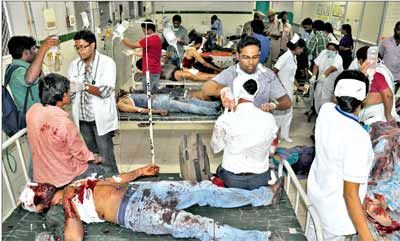
Hyderabad, Feb 24: Prime Minister Manmohan Singh visited the bomb blast sites in Hyderabad on Sunday and met some of the victims who are being treated in hospitals.
"I am here to share your pain and grief. We will take care of you," PM said to a vicitm Rajitha in Yashoda Hospital.
Talking to another victim, the PM said, "We will provide all possible medical help to you and others."
The Prime Minister, who reached Hyderabad by a special flight on Sunday morning, was accompanied by Andhra Pradesh governor ESL Narasimhan, chief minister N Kiran Kumar Reddy and top officials.
Singh inspected the tiffin centre area where the first bomb exploded, and later the bus shelter, scene of the second blast.
Senior police officials explained the sequence of events to the Prime Minister.
Two bomb blasts had left 16 people dead and 117 injured here last Thursday.





Comments
Add new comment